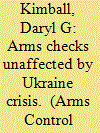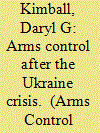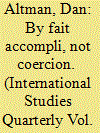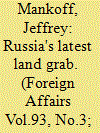|
|
|
Sort Order |
|
|
|
Items / Page
|
|
|
|
|
|
|
| Srl | Item |
| 1 |
ID:
130322


|
|
|
|
|
| Publication |
2014.
|
| Summary/Abstract |
Although the widening confrontation over the political future of the Crimean peninsula and other parts of the former Soviet Union has ruptured already-strained relations between Moscow and the West and put at risk the implementation of some nuclear risk-reduction initiatives and agreements, Russia is not planning to stop allowing the on-site inspections required under the 2010 New Strategic Arms Reduction Treaty (New START), Russian officials said last month. To protest Russia's actions to take control of Crimea, the seven non-Russian members of the Group of Eight (G-8) industrialized countries have suspended Russia's membership in the group. As part of that decision, the seven countries-Canada, Italy, France, Germany, Japan, the United Kingdom, and the United States-changed the location of their planned June summit from Sochi to Brussels. The Russian actions in Crimea have disrupted planning for the activities of the Global Partnership against the Spread of Weapons and Materials of Mass Destruction, which the G-8 launched in 2002.
|
|
|
|
|
|
|
|
|
|
|
|
|
|
|
|
| 2 |
ID:
130356


|
|
|
|
|
| Publication |
2014.
|
| Summary/Abstract |
The Global Nuclear Disarmament and risk reduction enterprise is at a crossroads as U.S.-Russian relations have reached perhaps their lowest point in more than a quarter century. Nevertheless, it remains in U.S. and Russian interests to implement existing nuclear risk reduction agreements and pursue practical, low-risk steps to lower tensions. Present circumstances demand new approaches to resolve stubborn challenges to deeper nuclear cuts and the establishment of a new framework to address Euro-Atlantic security issues.
Even before the recent political turmoil in Ukraine and Russian President Vladimir Putin's extralegal occupation and annexation of Crimea, relations between Moscow and Washington were chilly. Despite U.S. adjustments to its missile defense plans in Europe that eliminate any threat to Russian strategic missiles, Putin rebuffed U.S. President Barack Obama's proposal last June to reduce U.S. and Russian strategic stockpiles by one-third below the ceilings set by the New Strategic Arms Reduction Treaty (New START).
Moving forward will be difficult, but doing nothing is not an option. Through earlier crises during and after the Cold War, U.S. and Russian leaders pursued effective arms control and disarmament initiatives that increased mutual security and significantly reduced the nuclear danger. Much has been achieved, albeit too slowly, but there is far more to be done.
As the world's non-nuclear-weapon states persuasively argue, U.S. and Russian stockpiles still far exceed any plausible deterrence requirements, and the use of just a few nuclear weapons by any country would have catastrophic global consequences. As the 2015 Nuclear Nonproliferation Treaty (NPT) Review Conference approaches, pressure to accelerate action on disarmament will only grow.
For now, neither Russia nor the United States wants to scrap the existing arms control regime, including New START and the Intermediate-Range Nuclear Forces (INF) Treaty, which provide greater predictability and stability in an otherwise strained bilateral relationship. A return to a period of unconstrained strategic nuclear competition would not only deepen the distrust and increase dangers for both sides, but also would undermine the NPT. Scrapping the existing nuclear risk reduction measures would do nothing to protect Ukraine from further Russian aggression or reassure nervous NATO allies.
Unfortunately, the profound tensions over Ukraine delay the possibility of any formal, bilateral talks on nuclear arms reductions and missile defense. In light of these realities, Obama and other key leaders must explore alternative options to reduce global nuclear dangers and defuse U.S.-Russian strategic tensions.
|
|
|
|
|
|
|
|
|
|
|
|
|
|
|
|
| 3 |
ID:
157551


|
|
|
|
|
| Summary/Abstract |
In February 2014, Russia decided to wrest the Crimean Peninsula from Ukraine. Moscow could have threatened to attack Ukraine if Kiev failed to relinquish Crimea. However, Russia did not attempt coercion. Russia unilaterally occupied and annexed the territory, gambling that it could take Crimea without provoking war. This alternative strategy—the fait accompli—receives little scholarly attention. At issue is a fundamental question of statecraft in international politics: How do states make gains? By coercion or by fait accompli? Territorial acquisitions offer the best single-issue domain within which to address this question. Using new data on all “land grabs” since 1918, this research note documents a stark discrepancy. From 1918 to 2016, 112 land grabs seized territory by fait accompli. In that same span, only thirteen publicly declared coercive threats elicited cessions of territory. This fact suggests that the fait accompli deserves a larger role in the field's thinking about strategy and statecraft on the brink of war. It carries with it important implications for canonical theories of war that rely on assumptions about coercive bargaining during crises.
|
|
|
|
|
|
|
|
|
|
|
|
|
|
|
|
| 4 |
ID:
130468


|
|
|
|
|
| Publication |
2014.
|
| Summary/Abstract |
Russia's occupation and annexation of the Crimean Peninsula in February and March have plunged Europe into one of its gravest crises since the end of the Cold War. Despite analogies to Munich in 1938, however, Russia's invasion of this Ukrainian region is at once a replay and an escalation of tactics that the Kremlin has used for the past two decades to maintain its influence across the domains of the former Soviet Union. Since the early 1990s, Russia has either directly supported or contributed to the emergence of four breakaway ethnic regions in Eurasia: Transnistria, a self-declared state in Moldova on a strip of land between the Dniester River and Ukraine; Abkhazia, on Georgia's Black Sea coast; South Ossetia, in northern Georgia; and, to a lesser degree, Nagorno-Karabakh, a landlocked mountainous region in southwestern Azerbaijan that declared its independence under Armenian protection following a brutal civil war. Moscow's meddling has created so-called frozen conflicts in these states, in which the splinter territories remain beyond the control of the central governments and the local de facto authorities enjoy Russian protection and influence.
|
|
|
|
|
|
|
|
|
|
|
|
|
|
|
|
|
|
|
|
|